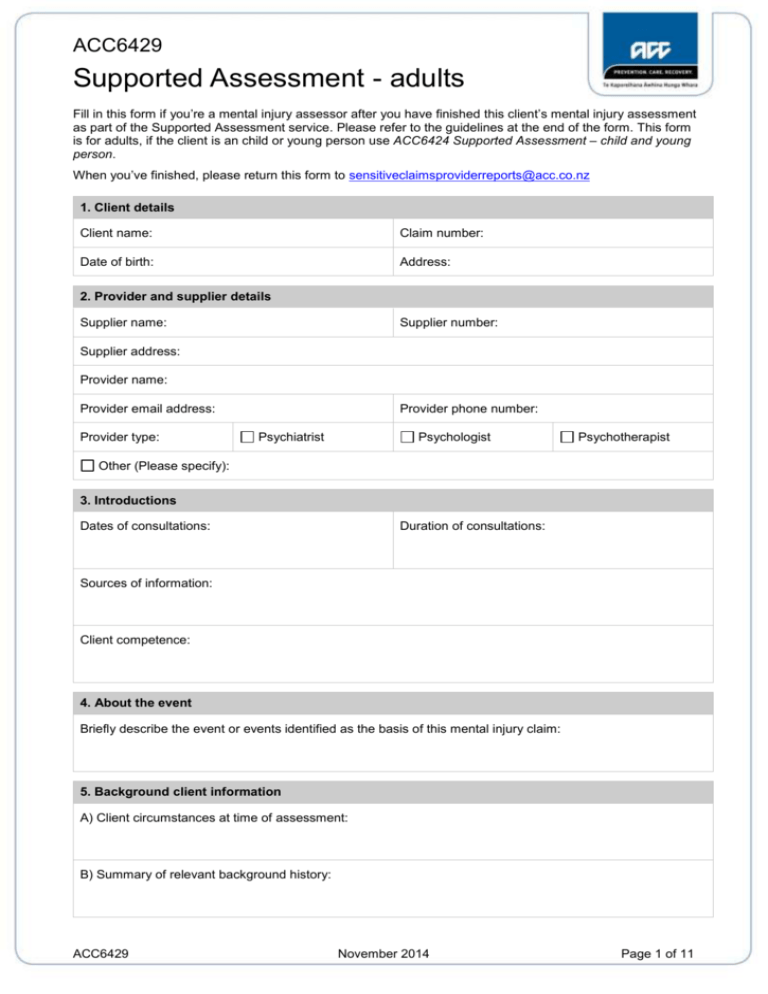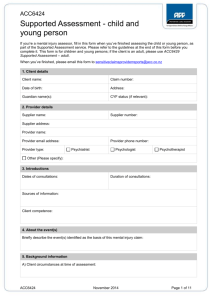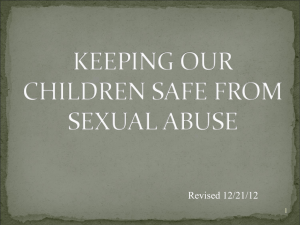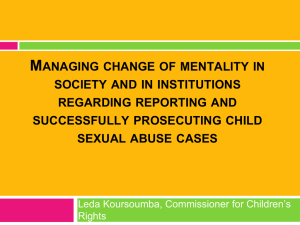ACC6429: Mental Injury Assessment Form - Adults
advertisement

ACC6429 Supported Assessment - adults Fill in this form if you’re a mental injury assessor after you have finished this client’s mental injury assessment as part of the Supported Assessment service. Please refer to the guidelines at the end of the form. This form is for adults, if the client is an child or young person use ACC6424 Supported Assessment – child and young person. When you’ve finished, please return this form to sensitiveclaimsproviderreports@acc.co.nz 1. Client details Client name: Claim number: Date of birth: Address: 2. Provider and supplier details Supplier name: Supplier number: Supplier address: Provider name: Provider email address: Provider type: Provider phone number: Psychiatrist Psychologist Psychotherapist Other (Please specify): 3. Introductions Dates of consultations: Duration of consultations: Sources of information: Client competence: 4. About the event Briefly describe the event or events identified as the basis of this mental injury claim: 5. Background client information A) Client circumstances at time of assessment: B) Summary of relevant background history: ACC6429 November 2014 Page 1 of 11 ACC6429 Supported Assessment - adults C) Presenting problems: D) Past psychiatric or psychological history including treatment for the presenting problems: If this client has received any treatment from another health provider(s) for this condition, please provide a contact name and address for each provider. Contact name: Contact email: E) Relevant medical history: F) Current medications and dosages: G) Alcohol, drug and gambling history: H) Family history: I) Cultural and spiritual background: J) Employment and education-related issues: K) Personal history: L) Forensic history: M) Summary of previous tests or assessments: 6. Diagnosis A) Personality assessment: B) Mental state examination: ACC6429 November 2014 Page 2 of 11 ACC6429 Supported Assessment - adults C) Psychometric testing (if relevant): D) Formulation: E) Client strengths: F) Diagnosis (and classification system used): If the diagnosis is not made using the ICD9 or ICD10 classification systems, please enter the ICD9 or ICD10 diagnostic code that corresponds to the diagnosis you are making here: G) Risk assessment: H) Symptom validity: 7.Opinion A) Relationship between the sexual abuse or sexual assault and the diagnosed mental conditions: B) Relationship between other life events and the diagnosed mental conditions: 8. Prognosis What is your prognosis for this client’s mental injury? 9. WHODAS 2.0 Results of the World Health Organization Disability Assessment Schedule 2.0 (WHODAS 2.0): Domain Score Domain Understanding and communicating: Getting around: Self-care: Getting along with people: Life activities – household: Life activities – school or work: Participation in society: Total disability score: Score Qualitative data: ACC6429 November 2014 Page 3 of 11 ACC6429 Supported Assessment - adults A copy of the form is attached. 10. Other information Please provide any other information that you consider relevant, eg genograms. You may attach additional pages if required, and expand this section as much as you need. 11. Treatment Please provide any broad recommendations for treatment derived from your assessment: 12. Provider declaration and signature By entering my name in the signature field I confirm that the information contained in this report is accurate, and that I have followed the standards explained in the Operational Guidelines. Signature: Date: List other providers responsible for completing this form. I have explained to the client that the information collected during the assessment will be sent to ACC and obtained their authority for this. When we collect, use and store information, we comply with the Privacy Act 1993 and the Health Information Privacy Code 1994. For further details see ACC’s privacy policy, available at www.acc.co.nz. We use the information collected on this form to fulfil the requirements of the Accident Compensation Act 2001. ACC6429 November 2014 Page 4 of 11 ACC6429 Supported Assessment - adults Guidelines for completing Supported Assessments Use these guidelines when you assess ACC clients who have lodged a claim for a mental injury caused by a sexual abuse event. Part A discusses key terms and Part B is the guidelines for completing the attached ACC235 Supported Assessment – adults form. PART A – Key terms and guidelines for assessment of sexual abuse related mental injury Guidelines These guidelines have been informed by clinicians from the mental health field, who were brought together by ACC to provide clinical advice on the cover process and these guidelines. Cover Deciding cover for mental injury involves establishing that the sexual abuse event, as defined by Schedule 3 of the Accident Compensation Act 2001 (AC Act 2001), has caused the client to develop a clinically significant behavioural, cognitive or psychological dysfunction, ie a ‘mental injury’, as defined in the AC Act 2001. Deciding cover for a sexual abuse-related mental injury requires establishing that the event meets the criteria for a Schedule 3 event. For these claims, this does not mean the client has to have proof that the event occurred, ie, the event does not have to have been witnessed by others, does not have to have resulted in formal charges against or conviction of the perpetrator and need not have been previously disclosed by the client. Sexual abuse event To be considered a sexual abuse event, the event(s) must meet all of the criteria. The event must have: occurred in New Zealand or occurred while the client was an ordinary resident of New Zealand temporarily travelling overseas involved the occurrence of any one or more of the events listed as Schedule 3 events under the AC Act 2001. Whilst it is acknowledged that other events of a sexual nature might have been very distressing for the client, only those events that clearly meet the definitions under the AC Act 2001 can be considered as sexual abuse events. Clinically significant mental injury To be considered a clinically significant mental injury, ACC requires a diagnosis based on a diagnostic framework that supports the concept of clinical significance. Acceptable diagnostic frameworks are: DSM IV DSM-5 Psychodynamic Diagnostic Manual (PDM) ICD-10 DC:0-3R. Your mental injury assessment must differentiate between a normal distress response and a persisting response, which is associated with dysfunction or disability. Use the World Health Organisation Disability Assessment Schedule (WHODAS 2.0) to assess disability as DSM-5 is no longer multidimensional and no longer includes the Global Assessment of Functioning. Please include the following items in the assessment: ACC6429 November 2014 Page 5 of 11 ACC6429 Supported Assessment - adults Collateral information about the signs and symptoms and resulting impairment. Collateral information can be in the form of past medical records from GP or other mental health providers, records from other agencies such as Child Youth and Family (CYF), or accounts from family, friends, educational providers or employers pre-and post-injury. This information might help to provide a more accurate and full picture of pre-and post-injury presentation, the course of any impairment over time and any non-abuse related factors that might have contributed to the overall presentation, eg exposure to domestic violence, poor attachment, serious physical health problems, family history of other mental health or behavioural problems. It might also help to determine the clinical significance of any impairment resulting from injury in the client’s social, occupational and other relevant environment. Consideration of symptom exaggeration and how it affects the diagnosis. Symptom exaggeration is occasionally an important feature of a clinical presentation. In the ACC cover process, the exaggeration of a client’s symptoms may undermine the ability of the clinician to draw conclusions about the mental health condition or the event. For this reason and to avoid singling out any particular individual, you should conduct an evaluation for symptom exaggeration as a routine part of the assessment process. ACC may seek further opinion if necessary. Use of standardised instruments to provide supportive information for the clinical formulation Psychometric instruments can help you determine what symptoms the client is experiencing and can assist in focusing the interview. Consider using both qualitative and quantitative data without relying exclusively on one or the other. Using psychometric instruments that help determine the consistency of the reported symptoms can inform an objective evaluation. Where a significant inconsistency arises, consider the options to investigate this further. Diagnosis of mental injury and its relationship to the sexual abuse event You should demonstrate a causal link in the mental injury assessment between the sexual abuse event and the onset or development of symptoms. Provide a careful inquiry of pre-injury symptoms where this is possible, eg if the event(s) has/have occurred in adulthood. Where this isn’t possible, eg if sexual abuse events occurred in childhood or there is little information about pre-injury functioning, you should carefully consider the development and progression of the mental injury and the client’s wider context to identify and fully consider all factors that have contributed to the presentation. The sexual abuse must be a material or significant cause of the condition diagnosed as clinically significant, but it does not have to be the only material or significant cause of the condition. It’s important that you distinguish whether the sexual abuse caused the mental injury, instead of being a trigger or the final straw in a succession of stressful events. You should also determine whether the presenting issues might be better accounted for by other factors in the client’s life, circumstances or development. You should examine GP notes, DHB notes or other notes from relevant health professionals or other agencies to help provide supporting discussion and documentation. These will be particularly important in assessing claims where the sexual abuse event occurred some time ago. Key terms Below are the relevant legislative terms and phrases used by ACC to determine cover for this type of claim. ACC6429 November 2014 Page 6 of 11 ACC6429 Supported Assessment - adults Term Definition and explanation Mental injury A clinically significant behavioural, cognitive or psychological dysfunction (defined in section 27 of the AC Act 2001). ACC considers that a psychological dysfunction is considered clinically significant if it meets the diagnostic criteria specified in currently available diagnostic tools All diagnostic formulations must be made with reference to the diagnostic tool used. Schedule 3 event Cover for mental injury caused by certain acts dealt with in the Crimes Act 1961. A full list of these acts is available on the following website. http://www.acc.co.nz/for-providers/lodge-and-manage-claims/PRV00031 Occurring in New Zealand or while an ordinary resident of New Zealand The sexual abuse event occurred in New Zealand or, if occurring outside of New Zealand, occurred while the client was ordinarily resident in New Zealand. A person is an ordinary resident in New Zealand if New Zealand is their permanent place of residence and one of the following applies: they are a New Zealand citizen they hold a residence class visa granted under the Immigration Act 2009 they are exempt from any requirement to hold a resident class visa under the Immigration Act 2009 they are the spouse, partner, child or dependant who generally accompanies a person who fits one of the above criteria PART B – Guidelines for completing the ACC6429 Supported Assessment – adults form Sections 1 and 2: Please complete all sections. Section 3: Introductions Sources of information Please list and number all sources of information used in completing the assessment. Identify the nature of the information, eg document, interview or phone contact, the origin or author of the information and the date of the information. If undated, please note. You should also note any information that you know to be available, yet wasn’t available to you. Client competence Record any concerns about competence to participate in such an assessment, if appropriate. ACC6429 November 2014 Page 7 of 11 ACC6429 Supported Assessment - adults Section 4: About the event Briefly describe each event. Include details such as the circumstances, location, memory and reaction at the time, and injuries caused. Explicit details are not required but brief details of the events, sufficient to establish that they represent Schedule 3 events, should be included. For each event please give the following details: date of event age of the client at the time relationship between the client and perpetrator (if any) age and gender of the perpetrator frequency of events and time period over which this occurred brief details of the events. Section 5: Background information A. Client circumstances at time of assessment Please identify the client’s demographic and general social circumstances at the time of assessment, including housing, work, leisure and relationships. If anyone accompanied the client to the assessment, make a note of their name and relationship to the client. Some assessors may include this information in some other section of their report. B. Summary of relevant background history You should include a brief summary of historical issues in this section, setting the platform for the assessment and providing the wider context in which the Schedule 3 event occurred. C. Presenting problems It’s important that you identify problems described by the client and give a comprehensive account of any clinical signs or symptoms you describe. Describe the original onset and progression of symptoms including dates of onset of particular symptoms, and note effects of the trauma on thinking and cognition. It’s also important that you record any resulting impairment or disability and the extent to which each impedes full rehabilitation for the client. We require that the World Health Organisation Disability Assessment Schedule (WHODAS 2.0) be filled in by the client for this purpose. ACC uses the WHODAS 2.0 as an outcome measure for all clients. It can be helpful to comment on any other assessments that have been previously completed and identify where, if at all, the client’s account of the mental injury, symptoms or events differs. Please reference information outlined in this section clearly and accurately. D. Past psychiatric or psychological history, including treatment for the presenting problems Please summarise any past psychological and/or psychiatric history. Describe pre-event experience of symptoms and/or psychosocial difficulties. Give a clear account of the times treatment was received, what the treatment was, what were its effects and what, if any, were the identified problems. Please also note the details of any previous treatment providers, if known. E. Relevant medical history ACC6429 November 2014 Page 8 of 11 ACC6429 Supported Assessment - adults Include any past medical history relevant to this assessment or to any presenting mental health difficulties. F. Current medications and dosages List all current medications and dosages and any relevant past medication. G. Alcohol, drug and gambling history Please record a full alcohol, drug and gambling history. Include the nature, frequency, and pattern of use or behaviour over time, and amounts of any alcohol and substances that might be used. Record whether the client describes any symptoms or signs of abuse or dependence, what problems their alcohol, drug or gambling use or behaviour may have caused them, whether they have accessed previous treatment or rehabilitation programmes and whether these were successful. It’s particularly important to record the current pattern of use/behaviour and what difficulties this might be causing the client in areas that might be important for occupational rehabilitation. If you diagnose any alcohol, drug or gambling related problem, please include the raw data to support your diagnosis. H. Family history Where appropriate, record a summary of family relationships and functioning, including any family history of mental health, alcohol or drug problems. Note family of origin and current family composition and relationships, nature of the family environment, the client’s relationships with family, friends and past and present partners or spouses. I. Cultural and spiritual background Summarise the client’s relevant cultural and spiritual background and outline any particular cultural needs that ACC might need to be aware of. J. Employment and education-related issues Record any relevant issues the client has in their workplace that could influence their presentation. Include details of any occupational functioning over time. K. Personal history A general summary of the client’s personal history is important. If you identify any mental health disorders, please record a more comprehensive account of the personal history. Please take care to only record clinically relevant personal information. Possible information includes pregnancy, birth, achievement of milestones, childhood and early development, schooling, friendships, intimate relationships, occupational history, adult relationships, children, pastimes and activities. Obtain a history of any physical or emotional abuse. L. Forensic history Please record any pattern of misdemeanours and list any convictions and imprisonments. M. Summary of previous tests or assessments You may find it helpful to identify other tests or assessments that may have been undertaken previously, particularly if there were findings relevant to the current assessment. This is also a good opportunity to identify other tests or assessments that may be helpful in further clarifying aspects of the client’s presentation. ACC6429 November 2014 Page 9 of 11 ACC6429 Supported Assessment - adults Section 6: Diagnosis A. Personality assessment You may undertake clinical and/or standardised testing if indicated to identify relevant aspects of personality function. Please resist making premature comments about personality function before you have obtained sufficient supporting evidence. B. Mental state examination Undertake a full mental state examination (MSE) and record relevant findings in each report. Include all areas of an MSE, using an accepted format with a comprehensive account of any relevant abnormal phenomena. You should also include a comment on suicide risk, any thoughts of harm towards others, cognitive function and assessment of insight and judgement. C. Psychometric testing (if relevant) Please indicate any other tests or assessments that you used to further clarify aspects of the client’s presentation. D. Formulation Please try to summarise all positive and significant negative findings that are relevant to aspects of the client’s psychosocial and occupational rehabilitation. It’s particularly important that you address any issues that might create barriers for rehabilitation. This doesn’t have to be long but should encompass aspects of the individuality of this person. You need to include a discussion of predisposing, precipitating, maintaining and protective factors in your formulation. E. Client strengths Please outline any particular strengths the client has in areas such as cognitive, academic, social, behavioural and psychological functioning. F. Diagnosis Please outline any formal psychiatric or psychological diagnoses that you think are appropriate and reference them clearly to the classification system used. Consider the following questions: In your opinion, does the client have a clinically significant mental condition? If so, what factors indicate this? What is the diagnosis? Please define precisely and outline the classification system used. If, in your opinion, your diagnosis differs from previous diagnoses, please give reasons for the difference. If you haven’t used the ICD9 or IDC10 classification systems please enter a ICD9 or IDC10 code as well. G. Risk assessment Where appropriate, please undertake a risk assessment and reference this to an accepted method of conducting such an assessment, eg HRC 20, static and dynamic risk. The assessment should formulate risk and identify any particular situations in which the client may present issues of risk; and you should include ways in which these risks can best be monitored and mitigated. ACC6429 November 2014 Page 10 of 11 ACC6429 Supported Assessment - adults G. Symptom validity Please record your valuation for symptom exaggeration during the assessment process, including any tests this client has taken as part of your evaluation. Section 7: Opinion A. Relationship between the sexual abuse or sexual assault and the diagnosed mental conditions Please answer the question “Are the sexual abuse event(s) a significant cause of the diagnosed mental condition(s)?” If there is more than one diagnosis, consider each diagnosis separately, and provide a rationale for your conclusion(s). Take into account the guidelines provided. For definitions of ‘event’ and ‘mental condition’ see Part A. B. Relationship between other life events and the mental condition Please outline if applicable what other issues, life events or incidents, separate from the claimed injury or events of this incident, may have contributed to the client’s current mental condition. Please indicate what effect these are having on the client’s mental state. Section 8: Prognosis What is the prognosis for this client? If applicable, please indicate your prognosis for this client’s mental injury(s) and the severity of the client’s condition(s). Section 9: WHODAS 2.0 Please administer the World Health Organization Disability Assessment Schedule 2.0: Use the 36-item version, self-administered by the client. If necessary, there is a proxy-administered version if the individual is of impaired capacity and unable to complete the form. Both of these forms are available on http://www.who.int/classifications/icf/whodasii/en/ . Please request that the client reads all instructions carefully. Use the qualitative data section to comment on/explain the ratings and make observations about the client’s functioning in everyday contexts. Please send a copy of the form attached to the report. Section 10: Further Information Please provide any other relevant information that may help ACC to determine whether the client has suffered a mental injury as a result of a Schedule 3 event. Section 11: Broad recommendations for treatment While this report is for you to provide us with your assessment of our client’s mental injury; we understand that the determination of treatment recommendations is a routine part of assessment. Please provide any broad recommendations for the treatment of this client here. Section 12: Provider declaration and signature Please complete, sign and date this section. ACC6429 November 2014 Page 11 of 11










